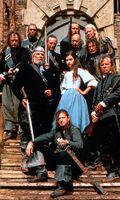 Lorna
Doone
Lorna
Doone
 Lorna
Doone
Lorna
Doone
By Steven Oxman (Variety writer)
Set
in the "west country" of 17th century Great Britain, action
romance "Lorna Doone" presents the closest vision we'll
come to a European Wild West. In this realm out of reach of the
authorities, the bad guys terrorize the villagers without fear of
recrimination, and the story breaks down neatly into heroes and
villains, with periodic showdowns between them. Of course, these are
Brits, so there's also plenty of class conflict and political intrigue
as well as a far more sophisticated tone than one might find in, say,
"Lorna Earp." There's also particularly strong acting and
rock-solid storytelling, which certainly make this three-hour movie on
A&E a pleasurable experience.
Based on R.D. Blackmore's Victorian-era novel, "Lorna Doone" is first and foremost a romance between two young lovers, John Ridd and the title character, from warring families. We see them meet innocently as children and then not so innocently later on, and John is thoroughly dismayed to discover that the lovely Lorna belongs to the Doone clan, an aristocratic family that has fallen from grace and now rules over this remote land with the anarchic violence of a rogue gang. Lorna, of course, is nothing like the rest of her family. This means two things in terms of English lit: John will court her even though her family murdered his father, and she has a secret heredity that'll be revealed later.
So John (Richard Coyle) and Lorna (Amelia Warner) fall in love, knowing all along that she is part of head honcho Ensor Doone's larger plan, involving the villainous heir to this ragtag kingdom, Carver Doone (Aidan Gillen from the British "Queer as Folk"). If this were an American story, we'd get a good ol' pistol duel, and we come pretty close with a musket battle at the midway point that's effectively realized by director Mike Barker and editor Guy Bensley.
The second half brings in more of the political context of the era -- the fight for ascension to the British crown between the Catholic James and the Protestant Duke of Monmouth. Surprise, surprise, this also splits the Doones and the Ridds.
Screenwriter Adrian Hodges does an excellent job of juggling all the various narrative elements here, keeping it all clear and connected. There's a lot going on, but the center remains John and Lorna, who get split up for a lengthy time and have to deal with their difference in class status.
The film looks pretty, with cinematographer Chris Seager and production designer Sophie Becher making strong, atmospheric use of the foggy Welsh landscape. Nic Ede's costumes provide the appropriate period elements and never get too precious. Overall, helmer Barker gives us a sense of the grittiness of the era, and John Lunn's moody music helps unify the romance and action elements.
Above all, this co-production boasts some terrific performances, from the romantic leads in Coyle and Warner to the obsessive nastiness Gillen brings to Carver. Peter Vaughan is especially fine as Ensor Doone; Martin Clunes is just right as Jeremy Stickles, a militia figure who helps John navigate the political arena; and Michael Kitchen delivers a brief but subtly delicious turn as impatient Judge Jeffreys. Many others in this large cast also shine in small roles.
Filmed in England and Wales by A&E
Network and the BBC. Executive producers, Delia Fine, Jane Tranter,
Gareth Neame; producer, Deirdre Keir; line producer, Alison Gee;
director, Mike Barker; writer, Adrian Hodges, based on the novel by R.D.
Blackmore. Characters & Cast:
John Ridd - Richard Coyle,
Lorna Doone - Amelia Warner,
Carver Doone - Aidan Gillen,
Jeremy Stickles - Martin Clunes,
Judge Jeffreys - Michael Kitchen,
Baron de Whichehalse - Martin Jarvis,
Sarah Ridd - Barbara Flynn,
Sir Ensor Doone - Peter Vaughan,
Counsellor Doone - Anton Lesser,
Tom Faggus - Anthony Calf,
Reuben Huckaback - Jack Shepherd,
Marwood de Whichehalse - Jesse Spencer.